Starting here in part 2, I discuss in some detail personal favorites from the collection in no particular order.
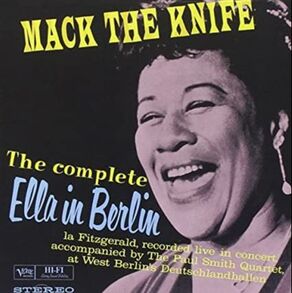
William F. Lee’s Jazz Singers Biographical Dictionary claims Fitzgerald was considered by many to be the finest female jazz singer of all time.
Taken at face value (ignoring those who considered her a pop singer) evidence for “the finest female jazz singer ever” can be found in her famous “Song Book” albums where she recorded definitive studio orchestra versions of the American Songbook composers Berlin, Gershwin, Arlen, Ellington, Kern, Mercer, Porter, and Rodgers and Hart. But even more important are the many concert/nightclub stage recordings where her highness is backed by a small jazz combo.
In this regard, one only has to look no further than the best of the lot, Grammy-winning Ella in Berlin backed by the Paul Smith Quartet. Ella’s assured sense of rhythm and close rapport with the musicians is evident throughout, on the slow ballads as well as the virtuoso scat numbers. The program is superbly varied.
Thirteen songs equally divided between slow, medium, and up-tempo numbers.
Gershwin’s “Summertime” is sung straight with minimum vibrato, while his “Lorelie” is a slow tempo swinger.
On “Our Love Is Here to Stay” (Gershwin again) and personal favorite “Gone with the Wind” her instrumental phrasing comes to the fore, leaving little doubt that she is an ambrosial class singer; at times stuttering a word into three or four syllables, speeding up or slowing down a line, creating new interesting melodies while still paying homage to the source.
But it is “Mack the Knife” and “How High the Moon” that elevate this album to precious metal status, and likely entry into the Library of Congress National Recording Registry someday. Ella’s “Mack” surpasses both the Louis Armstrong and Bobby Darin versions. Hard to believe because she forgets the lyrics at the outset but continues by making up her own whimsical lyrics as she goes along, picking them out of the air — wonderin’ what’s the next chorus to this song now, somethin’ ‘bout cash, trash, you won’t recognize it, it’s a surprise it — even mentioning the prior Darin and Armstrong recordings, scatting a delightful imitation of Satch.
This four-minute lighthearted musical improvisation, believe it or not, won best song by a female at the 1960 Grammy Award.
And to think, the next song, the last one in the concert, topped Ella’s rendition of “Mack.” Her take on “High the Moon” is a masterclass in scatting. Few jazz singers, male or female, have come this close to perfection, considering that the racehorse tempo of “Moon” is sustained over seven minutes.
The Paul Smith Quartet deserves high praise for the stellar support throughout, especially pianist Smith and drummer Gus Johnson.
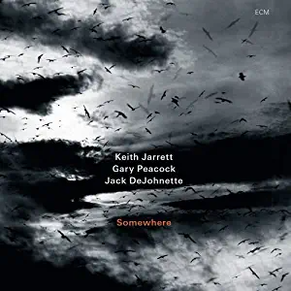
Keith Jarrett is one of the most widely admired jazz pianists on the planet — primarily known for his Koln Concert album, the best-selling solo album in jazz history.
The Koln did the trick for most, but for me, it was his Standards Trio albums with bassist Gary Peacock and drummer Jack DeJohnette.
Beyond reproach are the trio’s renditions of songs from the Great American Songbook (like “Blame It On My Youth,” “Body and Soul,” and “I Thought About You”) and the jazz repertory (“Woody ‘n You,” “Things Ain’t What They Used to Be,” and “Oleo”).
Especially beyond reproach are the occasional compositions of their own, typically mesmerizing trance-inducing vamps that for me were always an album highlight (like “The Cure,” on the The Cure, “Sunprayer” on Tribute One, and “U Dance” on Tribute Two). Perhaps the best of these appears on the 2013 album Somewhere.
Jarrett’s reading of the Leonard Bernstein–Stephen Sondheim “Somewhere/Everywhere” theme appropriately begins gentle and sublime, then at the five-minute mark of the 19-minute extravaganza, it gets “reconstructed and reshaped . . . into the driving, hypnotic improvisational ostinato coda Jarrett calls ‘Everywhere,’ with breathtaking chord voicings, forceful middle-register bass flourishes, and awe-inspiring tom-tom and cymbal work by DeJohnette; the track’s conclusion is drenched in royal gospel and regal blues” that fades into the distance, a chance for the audience to catch its breath before erupting into a rush of explosive shouts and applause.
The stage mic captures a round of laughter from the trio, as if to say, “How the hell did we pull this one off!”
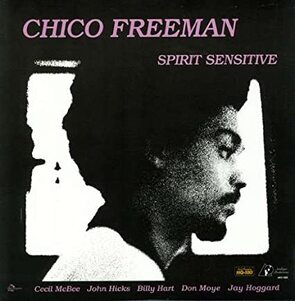
India Navigation
On Spirit Sensitive saxophonist Chico Freeman lends his pure sound and articulate relatable improvisations to 10 memorable songs composed by the following:
Great American Song Book composers Vernon Duke “Autumn In New York,” and Rodgers and Hart “It Never Entered My Mind,” as well as seven jazz musician composers: Thad Jones “A Child Is Born,” pianists Duke Ellington “Don’t Get Around Much Anymore” and Horace Silver “Peace,” bassist Cecil McBee “Closer to You Alone,” guitarist Luis Bonfa “Carnival,” singer Patti Austin “You Don’t Have to Say You’re Sorry,” and tenor saxophonist John Coltrane “Lonnie’s Lament” and “Wise One.”
All the jazz songs (save for those by Coltrane) have lyrics and are a testimony if you will, to their euphoniousness.
Freeman plays tenor on all of the above, except for “You Don’t Have to Say.” Chico is sensitively supported by bassist Cecil McBee, pianist John Hicks, and drummer Billy Hart, although the drums appear to be improperly recorded, the only flaw on the album.
Drum issue aside, this is one of the most beautifully realized albums. It starts with quality material and proceeds with masterful interpretations.
Perhaps I am overly biased in my opinion here, largely because (truth be told) my absolute favorite song is Patti Austin’s “You Don’t Have to Say You're Sorry,” and my favorite instrumental version is by Chico Freeman.
I first took notice of Austin in 1976 upon the release of her first album, End of the Rainbow, with the self-composed “You don’t have to say you’re sorry / but I sure do wish you would.”
I have played the song numerous times over the years and bought the album for friends. Chico plays it on soprano saxophone with minimal but perfectly placed jazz flourishes.
Tearfully gorgeous. Ms. Austin, I’m certain, would agree.
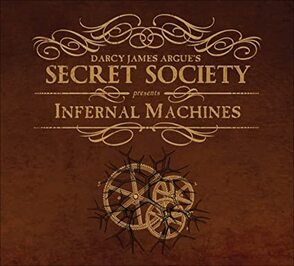
New Amsterdam
Spring 2009 saw the release of Infernal Machines by Darcy James Argue, composer/conductor of an 18-person swing-size big band called Secret Society (five winds, five trumpets/fluegelhorns, four trombones and four rhythm — drums along with acoustic and electric piano, guitar and bass.)
But Glen Miller, Tommy Dorsey it was not, nor was it ’50s Stan Kenton, ’60s Don Ellis, or even ’90s Maria Schneider. But what was it?
No ordinary big band album, that’s for sure. But critics loved it, though some struggled a bit to describe it.
To me, Machines offered a cornucopia of sounds, some familiar, some not, some loud, some soft, floating above shifting rhythms with an overall steady pulse.
Karl Ackerman (All About Jazz) said it more succinctly: “The sound is both complex and nuanced at the same time.” He also said, “Each influence blends seamlessly into the next without disrupting the content of the piece” — in effect, “a blending of new classical, indie rock and jazz.”
Larry Blumenthal (Wall Street Journal) described the band as “elegant in its combination of disparate influences from distorted electric guitar to magisterial wind instrument arrangements to minimalist rhythms.”
I concluded that Argue’s writing reflected the whole of contemporary music, as he sees it, into big band music for today.
Machines is art music created by an exceptionally talented composer/arranger executed by extraordinary competent musicians that remains as fresh and revolutionary today as when it was recorded. Argue’s debut album therefore belongs in every jazz fan's collection.
It telleth the future.
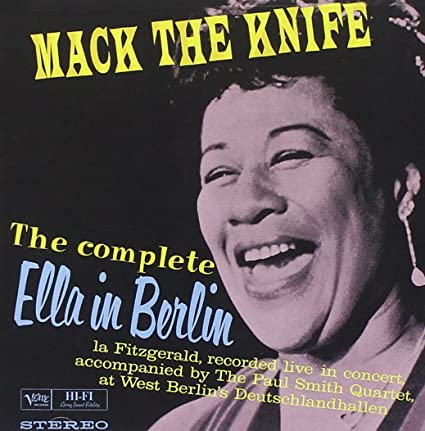
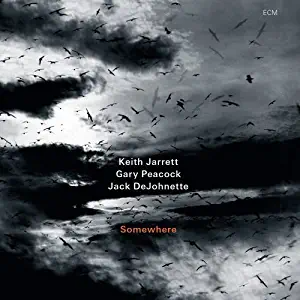
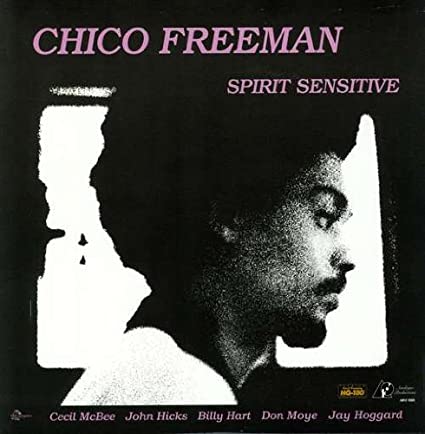
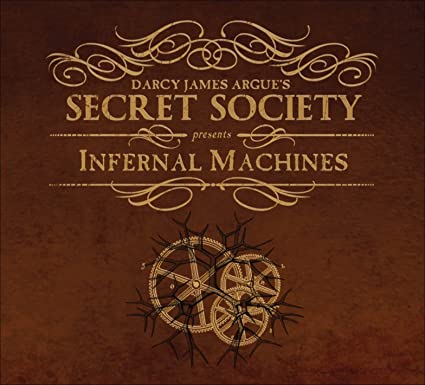

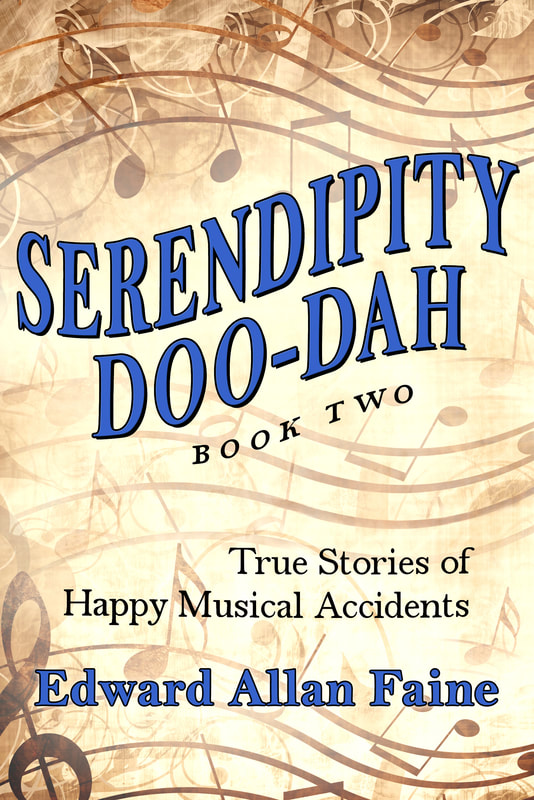
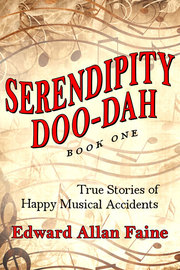
 RSS Feed
RSS Feed